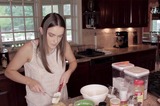
This course will provide skills in the area of food services and hospitality. These lessons are applicable to a capstone course in food service within a 3 seqence career pathway for Hospitality, Recreation and Tourism industry sector. The student receives training in kitchen safety and sanitation, equipment and facility use, knife skills, food preparation to include: cold pantry, salads, soups and sauces, introductory baking, meats and poultry, short order cook, hot-line, institutional cook, catering, cashiering, hostessing, waiter/waitress, and bussing. Students will participate in the planning, costing, preparation, serving, storage and critique of meals in project based learning. Nutrition and applied academic skills are incorporated in each unit. Career seeking and transferrable skills are incorporated into this curriculum culminating in a portfolio. Students that perform well could be placed in work-based learning environments.
- Subject:
- CTE
- Material Type:
- Full Course
- Lesson Plan
- Provider:
- Butte County Office of Education
- Provider Set:
- CTE Online
- Date Added:
- 05/04/2022
